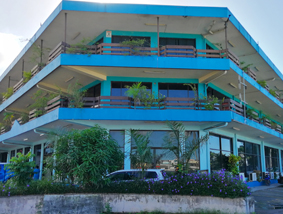Pacific Community (SPC) selected to host regional Maritime Technology Cooperation Centre (MTCC) for Pacific region in collaboration with Secretariat of the Pacific Regional Environment Programme (SPREP).

The selection of the SPC/SPREP consortium followed a competitive international tendering process. The MTCC-Pacific will form part of a global network of five centres, established under an ambitious project, funded by the European Union (EU) and implemented by IMO, to help mitigate the harmful effects of climate change.
The International Maritime Organization (IMO) has announced that the Pacific Community (SPC) has been selected to host the regional Maritime Technology Cooperation Centre (MTCC) for the Pacific region. SPC will host MTCC-Pacific in collaboration with the Secretariat of the Pacific Regional Environment Programme (SPREP).
The selection of the SPC/SPREP consortium followed a competitive international tendering process. The MTCC-Pacific will form part of a global network of five centres, established under an ambitious project, funded by the European Union (EU) and implemented by IMO, to help mitigate the harmful effects of climate change.
MTCC-Pacific joins MTCCs in Africa, Asia, the Caribbean and Latin America. In April, IMO announced that International Maritime University of Panama (UMIP) will host MTCC-Latin America. In February, IMO announced that Jomo Kenyatta University of Agriculture and Technology (JKUAT) will host MTCC-Africa. In December 2016, IMO announced that Shanghai Maritime University in China will host MTCC-Asia, while the University of Trinidad and Tobago will host MTCC-Caribbean.
The regional MTCCs will deliver the agreed project milestones over a three-year period, making a significant contribution to IMO’s continuing, widespread efforts to ensure effective implementation and enforcement of the global energy-efficiency regulations for international shipping.
The MTCCs will receive allocations from the €10 million European Union funding for the project. They will be established and resourced to become regional centres of excellence, providing leadership in promoting ship energy-efficiency technologies and operations, and the reduction of harmful emissions from ships.
Aims of the GMN project
Greenhouse gas emissions from shipping are expected to increase but developing countries, which play a significant role in international shipping, often lack the means to improve energy efficiency in their shipping sectors. This project, formally entitled “Capacity Building for Climate Mitigation in the Maritime Shipping Industry” will enable developing countries,
especially Least Developed Countries and Small Island Developing States, in the target regions to effectively implement energy-efficiency measures through technical assistance, capacity building and promoting technical cooperation.
The project will be implemented through the network of MTCCs which, once operational, will act as focal point for:
• improving capability in the region - by working with maritime administrations, port authorities, other relevant government departments and related shipping stakeholders to facilitate compliance with international regulations on energy efficiency for ships
• promoting the uptake of low-carbon technologies and operations in the maritime sector through pilot projects
• raising awareness about policies, strategies and measures for the reduction of ghg and other emissions from the maritime transport sector
• demonstrating a pilot-scale system for collecting data and reporting on ships’ fuel consumption to improve shipowners’ and maritime administrations’ understanding in this regard, and
• developing and implementing strategies to sustain the impact of MTCC results and activities beyond the project time-line.
SPC/SPREP consortium
Established in 1947, SPC is a scientific and technical organisation supporting development in the Pacific region. It combines a wide range of expertise and actions to address energy efficiency and shipping emissions in the context of mitigation of climate change impacts.
SPREP is an intergovernmental environmental organisation working in the Pacific. Establish in 1993, it promotes cooperation and provides assistance in order to protect but also to improve its environment to ensure sustainable development. Its work is focused on partnership with national, regional and international agencies to build capacity of Pacific islanders. SPREP is also the secretariat of the Waigani Convention and Noumea Convention.
Both SPC and SPREP have a track record in regional capacity-building activities related to maritime safety and security; trade facilitation and port efficiency; as well as the prevention of pollution from ships.
They have hosted different workshops and collaborated with IMO and other institutions, including United Nations Economic and Social Commission for Asia and the Pacific (ESCAP) and the World Bank.
MTCC-Pacific will be located at the office of the SPC Office in Nabua, Suva, Fiji, close to the city’s port and easily reached from Nausori Airport.
GMN project
Website: http://gmn.imo.org/
European Commission web site: Capacity Building for Climate Mitigation in the Maritime Shipping Industry:
http://ec.europa.eu/europeaid/projects/capacity-building-climate-mitigation-maritime-shipping-industry_en
